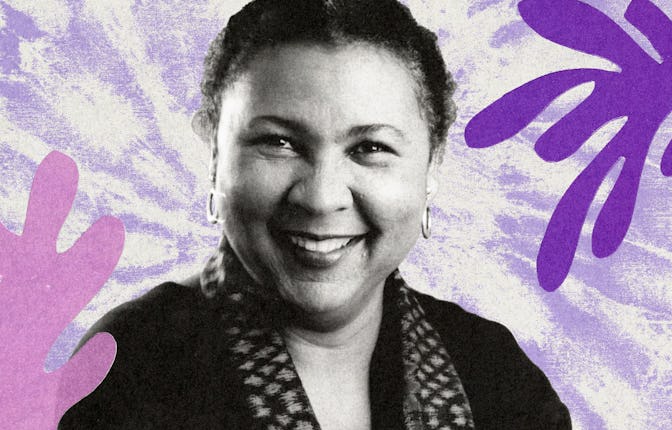bell hooks said the thing that nobody wanted to hear
One writer's personal reflections on what the brilliant author/filmmaker taught her about living wholly in her Blackness, queerness, and womanhood.

The esteemed author, feminist scholar, critic, and activist bell hooks passed away on Wednesday. As the news spread, the world slowed down to collectively mourn the life of a Black woman, a sister of many minds, and a genius who didn't wait for the world to name her as such It is not an overstatement to say that Black feminism in its current form would not exist without hooks’ cannonical books such as all about love, ain’t I a woman? and salvation. Outside of her scholarly work, hooks remained a critic who saw culture and media as some of the most important sites for critique and exploration, instead of the more stonewalled environment of academia.
How we enter bell hooks’ work is really a question of when we meet our first selves. For many of us, we were full of a generation’s long rage — and hooks gave us the words, sentences, and authority to call it love. For those just meeting her work today, a new door is awaiting you. Questions will persist on whether we gave hooks the flowers she deserved, or if we did enough to hold ourselves accountable when hooks asked us to sharpen our gaze. But today, we simply have to feel the aching thing before we can hear the awaiting call.
When I learned about the passing of a woman who demanded her wholeness, I thought of Dr. Beverly Guy Sheftall, president of the Women’s Center at Spelman College and close friend and comrade to hooks. I thought of their friendship, which started in 1981 at the National Women's Studies Association Conference. The two had a bond that saw the depths of loss, fame, and criticism. Between political differences and ever changing phases of life, they lost and found each other decade after decade. Today I am thinking of the heartache Dr. Guy-Sheftall is surviving, and the sisterhood between them that made me dream of one day loving the friends I made at Spelman as deeply as they cared for each other. How lucky we are to find a soulmate that helps us survive a lifetime. As a student at Spelman it was a routine joy to sneak into lectures and see Dr.Guy-Sheftall at her brightest around bell hooks and Alice Walker, her dearest friends as they occasionally lectured on campus. It reminded me that our elders have never asked for perfection, that they are at their core also Black girls asking questions and saying the thing that nobody wanted to hear, as we all are. I am grateful for the models of wholeness and care that bell helped create through her sisterhood with Dr. Guy-Sheftall, who made me the Black feminist I am today.
My second thought after hearing of hooks’s passing was how privileged I was to have fallen in love while reading her work. I spent hours reading salvation, her 2001 text about the inside workings of love in the Black community while in the throes of my very first Black queer love. It felt destined to be living and studying the thing every Black feminist writers ask of us: to live in our fullness, instead of shriveling in the shame that cishet white supremacy limits us to. The relationship, while intense, was full because of how we dove headfirst into salvation — hooks’s text made us ask ourselves questions about community, media, and if we took the work of self accountability seriously in our personal lives. As she states in salvation, “love remains for black people a crucial path to healing.”
She goes on to profess that not only is love an action, but having a deep political love for Black people, which she defines in her 1992 book Black Looks, Race & Representation, is the only way towards a future that brings us closer to the dream of liberation. hooks refused in her writing to leave out the systems that are whispered about in the dark corners. Every topic under the sun from class, ageism, patriarchy and the abuse of children was split open by her pen. hooks taught us a lesson that we have yet to take seriously: the act of love, the ugly work of forgiveness, and that we can no longer ignore what audre lorde calls our “uses of the erotic.” We must resist the thing killing us while we have the time to fight it.
Even when the relationship I was in faded by the following summer, I always found my way back to hooks’s work in the pits of heartbreak, in the loneliness that silenced me or when the dream of writing myself into the Black feminist lexicon woke me up at night. Even as I have tried to neglect that deep knowing, hooks always found me. Her work served as a starting point for what was already done. As I got older and my political frame rubbed up against what hooks would no longer have approved of, I knew I had to ask myself what was next. And while I am nowhere close to having an answer, I do know that hooks would tell me that there is much more writing to be done.